Abstract
Tumour was obtained from 37 patients with oestrogen receptor-positive breast cancer, before and during treatment with tamoxifen, and examined qualitatively and semi-qualitatively for mRNA of the three mammalian TGF-beta isoforms. Levels of TGF-beta isoforms were then correlated with tumour response to tamoxifen, as assessed by monthly ultrasound. A high incidence of expression by each isoform was found in tumour material taken both before and during treatment. Semiquantitative assessment of mRNA showed that in the majority of tumours, expression of TGF-beta s did not change markedly with treatment, i.e. beyond that which might have been caused by method reproducibility and tumour heterogeneity (variations of < 100% between pre- and post-treatment samples). In those displaying significant variation with treatment, expression of TGF-beta 1 and -beta 3 increased or decreased in equal numbers, whereas TGF-beta 2 expression tended to increase with treatment. Subdividing tumours by clinical response revealed no significant association between changes in expression of TGF-beta 1 and TGF-beta 3. There was, however, a significant correlation between changes in expression of TGF-beta 2 and response (P = 0.018). Thus, of 15 responding tumours displaying substantial changes, 11 showed an increase in TGF-beta 2 expression with treatment, whereas none of the non-responding tumours were associated with increased expression. While not providing evidence for a generalised increase in TGF-beta expression with tamoxifen treatment, the present study suggests that response to tamoxifen therapy may be associated with an increase in expression of specific TGF-beta isoforms in some, but not all, tumours.
Full text
PDF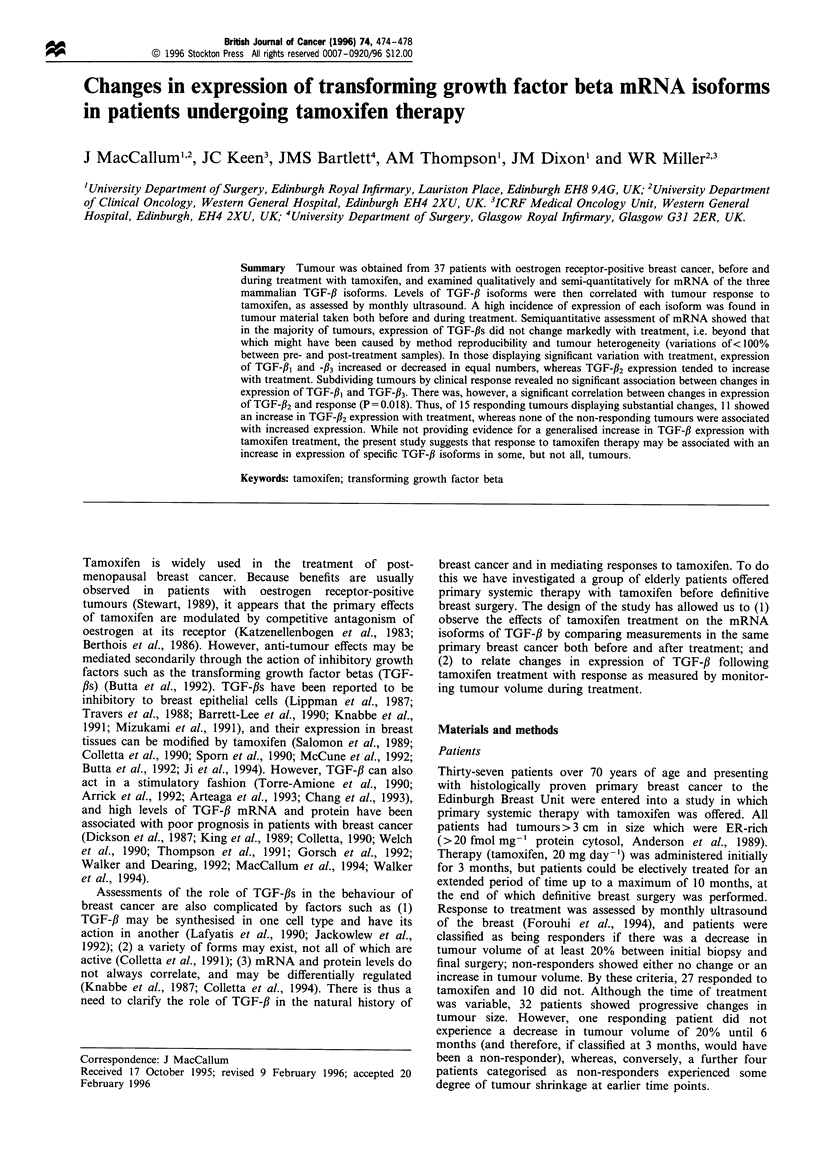
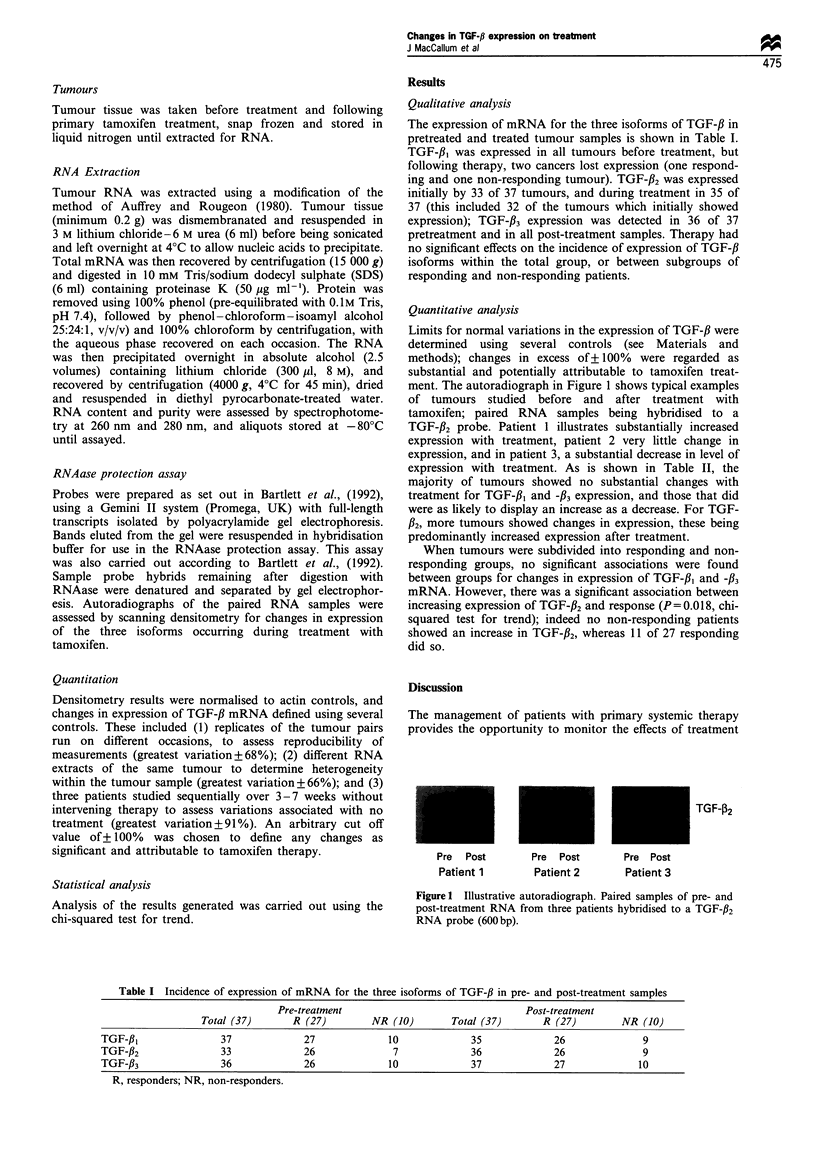
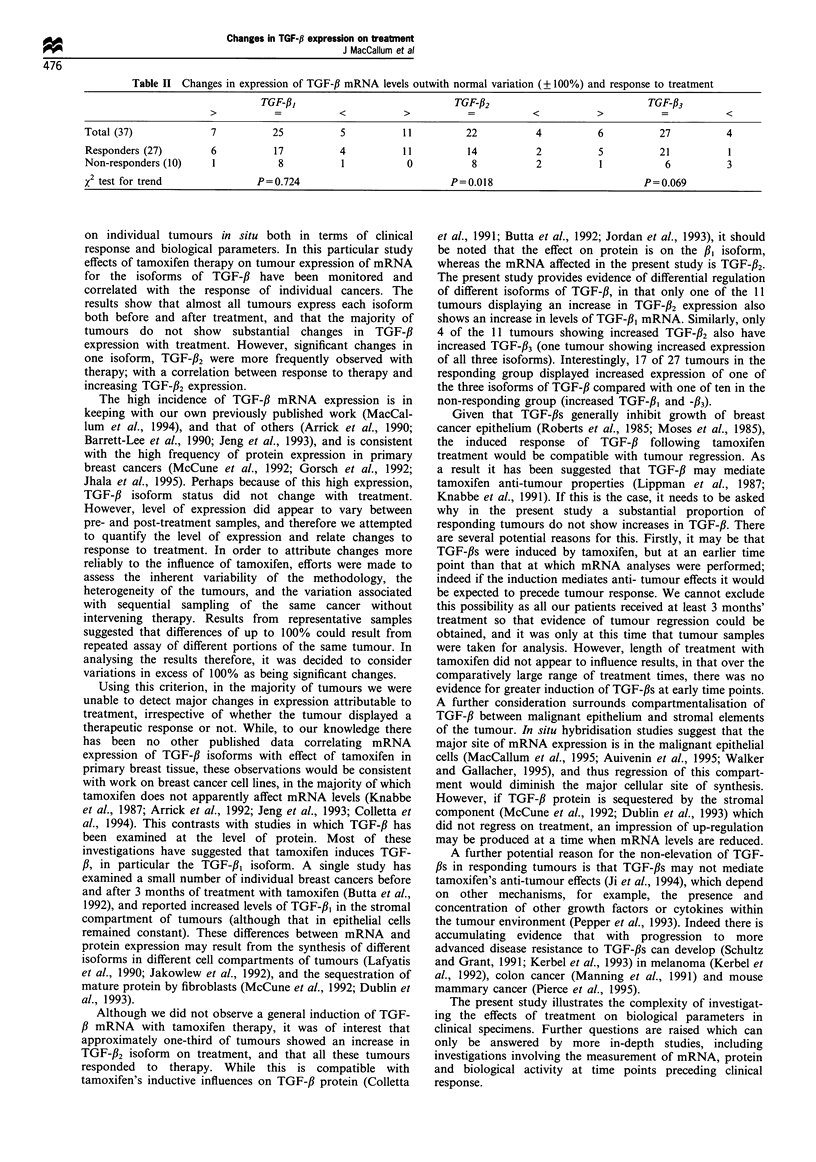
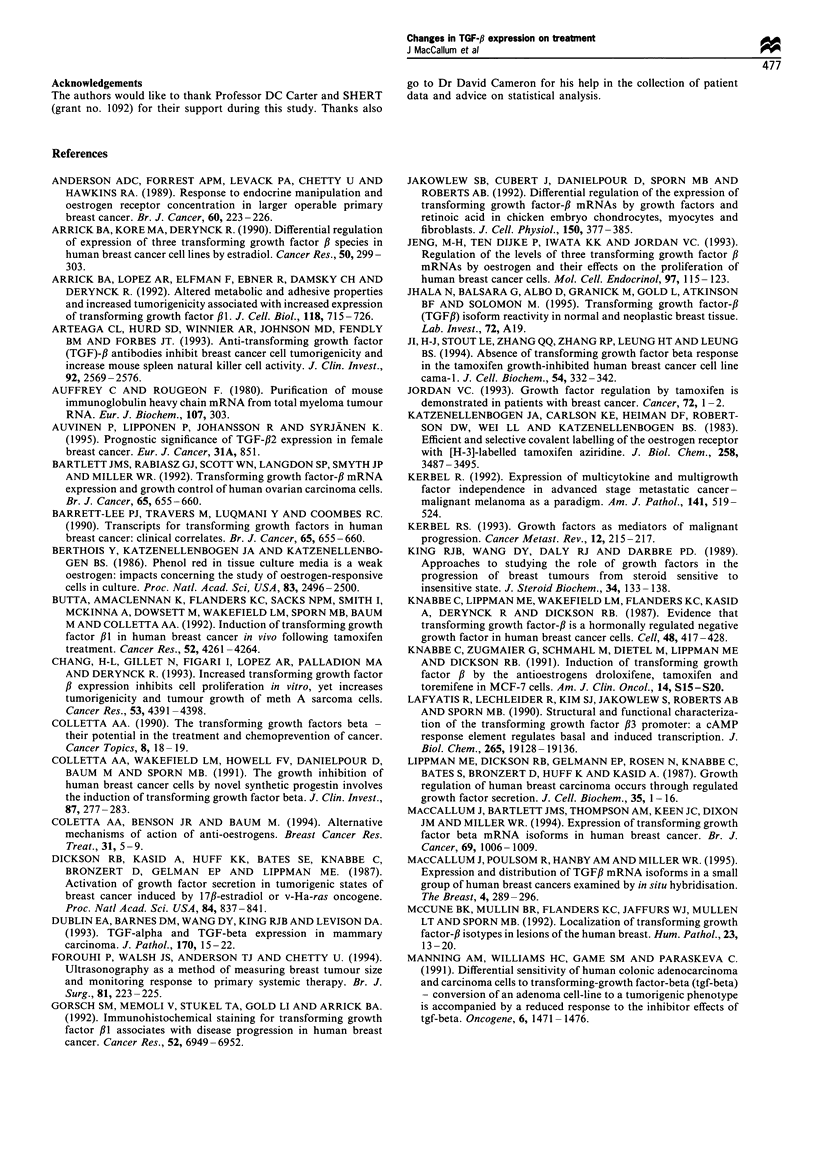
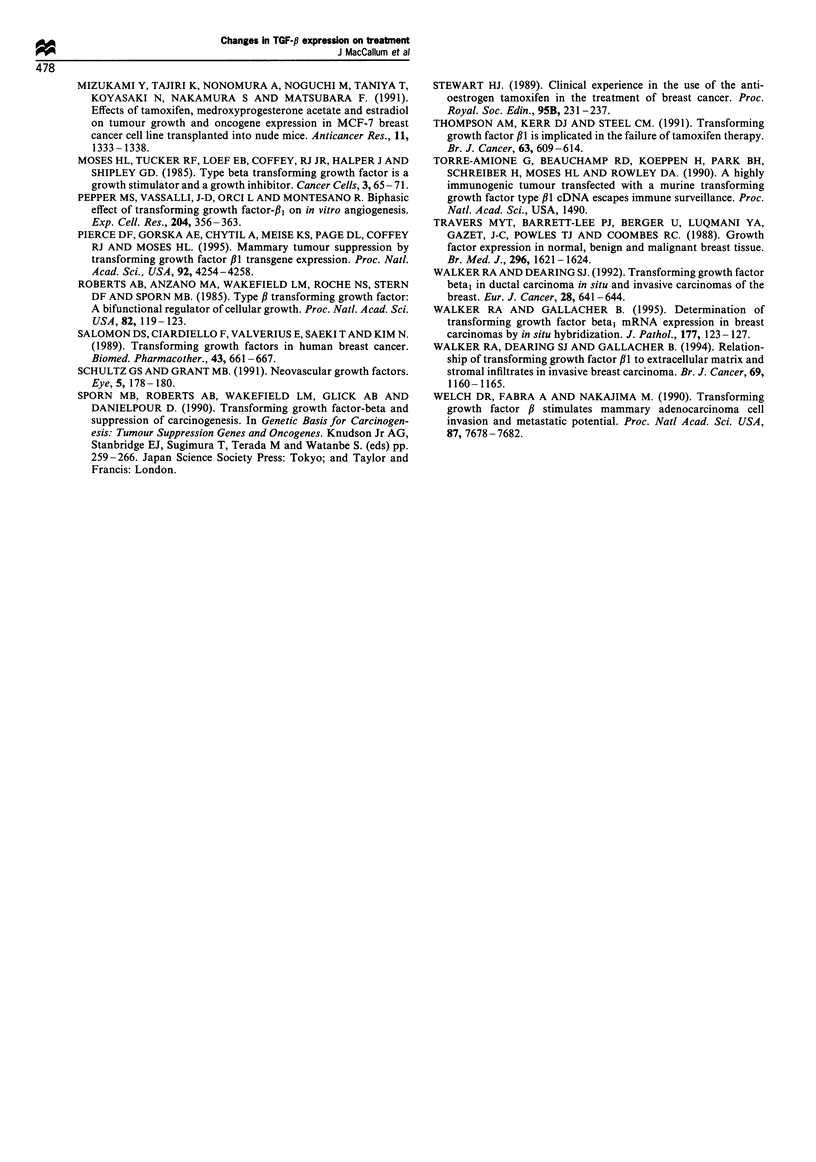
Images in this article
Selected References
These references are in PubMed. This may not be the complete list of references from this article.
- Anderson E. D., Forrest A. P., Levack P. A., Chetty U., Hawkins R. A. Response to endocrine manipulation and oestrogen receptor concentration in large operable primary breast cancer. Br J Cancer. 1989 Aug;60(2):223–226. doi: 10.1038/bjc.1989.256. [DOI] [PMC free article] [PubMed] [Google Scholar]
- Arrick B. A., Korc M., Derynck R. Differential regulation of expression of three transforming growth factor beta species in human breast cancer cell lines by estradiol. Cancer Res. 1990 Jan 15;50(2):299–303. [PubMed] [Google Scholar]
- Arrick B. A., Lopez A. R., Elfman F., Ebner R., Damsky C. H., Derynck R. Altered metabolic and adhesive properties and increased tumorigenesis associated with increased expression of transforming growth factor beta 1. J Cell Biol. 1992 Aug;118(3):715–726. doi: 10.1083/jcb.118.3.715. [DOI] [PMC free article] [PubMed] [Google Scholar]
- Arteaga C. L., Hurd S. D., Winnier A. R., Johnson M. D., Fendly B. M., Forbes J. T. Anti-transforming growth factor (TGF)-beta antibodies inhibit breast cancer cell tumorigenicity and increase mouse spleen natural killer cell activity. Implications for a possible role of tumor cell/host TGF-beta interactions in human breast cancer progression. J Clin Invest. 1993 Dec;92(6):2569–2576. doi: 10.1172/JCI116871. [DOI] [PMC free article] [PubMed] [Google Scholar]
- Auffray C., Rougeon F. Purification of mouse immunoglobulin heavy-chain messenger RNAs from total myeloma tumor RNA. Eur J Biochem. 1980 Jun;107(2):303–314. doi: 10.1111/j.1432-1033.1980.tb06030.x. [DOI] [PubMed] [Google Scholar]
- Auvinen P., Lipponen P., Johansson R., Syrjänen K. Prognostic significance of TGF-beta 2 expression in female breast cancer. Eur J Cancer. 1995;31A(5):851–851. doi: 10.1016/0959-8049(95)00019-f. [DOI] [PubMed] [Google Scholar]
- Bartlett J. M., Rabiasz G. J., Scott W. N., Langdon S. P., Smyth J. F., Miller W. R. Transforming growth factor-beta mRNA expression and growth control of human ovarian carcinoma cells. Br J Cancer. 1992 May;65(5):655–660. doi: 10.1038/bjc.1992.140. [DOI] [PMC free article] [PubMed] [Google Scholar]
- Berthois Y., Katzenellenbogen J. A., Katzenellenbogen B. S. Phenol red in tissue culture media is a weak estrogen: implications concerning the study of estrogen-responsive cells in culture. Proc Natl Acad Sci U S A. 1986 Apr;83(8):2496–2500. doi: 10.1073/pnas.83.8.2496. [DOI] [PMC free article] [PubMed] [Google Scholar]
- Butta A., MacLennan K., Flanders K. C., Sacks N. P., Smith I., McKinna A., Dowsett M., Wakefield L. M., Sporn M. B., Baum M. Induction of transforming growth factor beta 1 in human breast cancer in vivo following tamoxifen treatment. Cancer Res. 1992 Aug 1;52(15):4261–4264. [PubMed] [Google Scholar]
- Chang H. L., Gillett N., Figari I., Lopez A. R., Palladino M. A., Derynck R. Increased transforming growth factor beta expression inhibits cell proliferation in vitro, yet increases tumorigenicity and tumor growth of Meth A sarcoma cells. Cancer Res. 1993 Sep 15;53(18):4391–4398. [PubMed] [Google Scholar]
- Colletta A. A., Wakefield L. M., Howell F. V., Danielpour D., Baum M., Sporn M. B. The growth inhibition of human breast cancer cells by a novel synthetic progestin involves the induction of transforming growth factor beta. J Clin Invest. 1991 Jan;87(1):277–283. doi: 10.1172/JCI114983. [DOI] [PMC free article] [PubMed] [Google Scholar]
- Dickson R. B., Kasid A., Huff K. K., Bates S. E., Knabbe C., Bronzert D., Gelmann E. P., Lippman M. E. Activation of growth factor secretion in tumorigenic states of breast cancer induced by 17 beta-estradiol or v-Ha-ras oncogene. Proc Natl Acad Sci U S A. 1987 Feb;84(3):837–841. doi: 10.1073/pnas.84.3.837. [DOI] [PMC free article] [PubMed] [Google Scholar]
- Dublin E. A., Barnes D. M., Wang D. Y., King R. J., Levison D. A. TGF alpha and TGF beta expression in mammary carcinoma. J Pathol. 1993 May;170(1):15–22. doi: 10.1002/path.1711700104. [DOI] [PubMed] [Google Scholar]
- Forouhi P., Walsh J. S., Anderson T. J., Chetty U. Ultrasonography as a method of measuring breast tumour size and monitoring response to primary systemic treatment. Br J Surg. 1994 Feb;81(2):223–225. doi: 10.1002/bjs.1800810221. [DOI] [PubMed] [Google Scholar]
- Gorsch S. M., Memoli V. A., Stukel T. A., Gold L. I., Arrick B. A. Immunohistochemical staining for transforming growth factor beta 1 associates with disease progression in human breast cancer. Cancer Res. 1992 Dec 15;52(24):6949–6952. [PubMed] [Google Scholar]
- Jakowlew S. B., Cubert J., Danielpour D., Sporn M. B., Roberts A. B. Differential regulation of the expression of transforming growth factor-beta mRNAs by growth factors and retinoic acid in chicken embryo chondrocytes, myocytes, and fibroblasts. J Cell Physiol. 1992 Feb;150(2):377–385. doi: 10.1002/jcp.1041500222. [DOI] [PubMed] [Google Scholar]
- Jeng M. H., ten Dijke P., Iwata K. K., Jordan V. C. Regulation of the levels of three transforming growth factor beta mRNAs by estrogen and their effects on the proliferation of human breast cancer cells. Mol Cell Endocrinol. 1993 Nov;97(1-2):115–123. doi: 10.1016/0303-7207(93)90217-8. [DOI] [PubMed] [Google Scholar]
- Ji H., Stout L. E., Zhang Q., Zhang R., Leung H. T., Leung B. S. Absence of transforming growth factor-beta responsiveness in the tamoxifen growth-inhibited human breast cancer cell line CAMA-1. J Cell Biochem. 1994 Mar;54(3):332–342. doi: 10.1002/jcb.240540309. [DOI] [PubMed] [Google Scholar]
- Katzenellenbogen J. A., Carlson K. E., Heiman D. F., Robertson D. W., Wei L. L., Katzenellenbogen B. S. Efficient and highly selective covalent labeling of the estrogen receptor with [3H]tamoxifen aziridine. J Biol Chem. 1983 Mar 25;258(6):3487–3495. [PubMed] [Google Scholar]
- Kerbel R. S. Expression of multi-cytokine resistance and multi-growth factor independence in advanced stage metastatic cancer. Malignant melanoma as a paradigm. Am J Pathol. 1992 Sep;141(3):519–524. [PMC free article] [PubMed] [Google Scholar]
- King R. J., Wang D. Y., Daly R. J., Darbre P. D. Approaches to studying the role of growth factors in the progression of breast tumours from the steroid sensitive to insensitive state. J Steroid Biochem. 1989;34(1-6):133–138. doi: 10.1016/0022-4731(89)90073-3. [DOI] [PubMed] [Google Scholar]
- Knabbe C., Lippman M. E., Wakefield L. M., Flanders K. C., Kasid A., Derynck R., Dickson R. B. Evidence that transforming growth factor-beta is a hormonally regulated negative growth factor in human breast cancer cells. Cell. 1987 Feb 13;48(3):417–428. doi: 10.1016/0092-8674(87)90193-0. [DOI] [PubMed] [Google Scholar]
- Knabbe C., Zugmaier G., Schmahl M., Dietel M., Lippman M. E., Dickson R. B. Induction of transforming growth factor beta by the antiestrogens droloxifene, tamoxifen, and toremifene in MCF-7 cells. Am J Clin Oncol. 1991;14 (Suppl 2):S15–S20. doi: 10.1097/00000421-199112002-00005. [DOI] [PubMed] [Google Scholar]
- Lafyatis R., Lechleider R., Kim S. J., Jakowlew S., Roberts A. B., Sporn M. B. Structural and functional characterization of the transforming growth factor beta 3 promoter. A cAMP-responsive element regulates basal and induced transcription. J Biol Chem. 1990 Nov 5;265(31):19128–19136. [PubMed] [Google Scholar]
- Lippman M. E., Dickson R. B., Gelmann E. P., Rosen N., Knabbe C., Bates S., Bronzert D., Huff K., Kasid A. Growth regulation of human breast carcinoma occurs through regulated growth factor secretion. J Cell Biochem. 1987 Sep;35(1):1–16. doi: 10.1002/jcb.240350102. [DOI] [PubMed] [Google Scholar]
- MacCallum J., Bartlett J. M., Thompson A. M., Keen J. C., Dixon J. M., Miller W. R. Expression of transforming growth factor beta mRNA isoforms in human breast cancer. Br J Cancer. 1994 Jun;69(6):1006–1009. doi: 10.1038/bjc.1994.197. [DOI] [PMC free article] [PubMed] [Google Scholar]
- Manning A. M., Williams A. C., Game S. M., Paraskeva C. Differential sensitivity of human colonic adenoma and carcinoma cells to transforming growth factor beta (TGF-beta): conversion of an adenoma cell line to a tumorigenic phenotype is accompanied by a reduced response to the inhibitory effects of TGF-beta. Oncogene. 1991 Aug;6(8):1471–1476. [PubMed] [Google Scholar]
- McCune B. K., Mullin B. R., Flanders K. C., Jaffurs W. J., Mullen L. T., Sporn M. B. Localization of transforming growth factor-beta isotypes in lesions of the human breast. Hum Pathol. 1992 Jan;23(1):13–20. doi: 10.1016/0046-8177(92)90004-m. [DOI] [PubMed] [Google Scholar]
- Mizukami Y., Tajiri K., Nonomura A., Noguchi M., Taniya T., Koyasaki N., Nakamura S., Matsubara F. Effects of tamoxifen, medroxyprogesterone acetate and estradiol on tumor growth and oncogene expression in MCF-7 breast cancer cell line transplanted into nude mice. Anticancer Res. 1991 May-Jun;11(3):1333–1338. [PubMed] [Google Scholar]
- Pepper M. S., Vassalli J. D., Orci L., Montesano R. Biphasic effect of transforming growth factor-beta 1 on in vitro angiogenesis. Exp Cell Res. 1993 Feb;204(2):356–363. doi: 10.1006/excr.1993.1043. [DOI] [PubMed] [Google Scholar]
- Pierce D. F., Jr, Gorska A. E., Chytil A., Meise K. S., Page D. L., Coffey R. J., Jr, Moses H. L. Mammary tumor suppression by transforming growth factor beta 1 transgene expression. Proc Natl Acad Sci U S A. 1995 May 9;92(10):4254–4258. doi: 10.1073/pnas.92.10.4254. [DOI] [PMC free article] [PubMed] [Google Scholar]
- Roberts A. B., Anzano M. A., Wakefield L. M., Roche N. S., Stern D. F., Sporn M. B. Type beta transforming growth factor: a bifunctional regulator of cellular growth. Proc Natl Acad Sci U S A. 1985 Jan;82(1):119–123. doi: 10.1073/pnas.82.1.119. [DOI] [PMC free article] [PubMed] [Google Scholar]
- Salomon D. S., Ciardiello F., Valverius E., Saeki T., Kim N. Transforming growth factors in human breast cancer. Biomed Pharmacother. 1989;43(9):661–667. doi: 10.1016/0753-3322(89)90084-x. [DOI] [PubMed] [Google Scholar]
- Schultz G. S., Grant M. B. Neovascular growth factors. Eye (Lond) 1991;5(Pt 2):170–180. doi: 10.1038/eye.1991.31. [DOI] [PubMed] [Google Scholar]
- Thompson A. M., Kerr D. J., Steel C. M. Transforming growth factor beta 1 is implicated in the failure of tamoxifen therapy in human breast cancer. Br J Cancer. 1991 Apr;63(4):609–614. doi: 10.1038/bjc.1991.140. [DOI] [PMC free article] [PubMed] [Google Scholar]
- Torre-Amione G., Beauchamp R. D., Koeppen H., Park B. H., Schreiber H., Moses H. L., Rowley D. A. A highly immunogenic tumor transfected with a murine transforming growth factor type beta 1 cDNA escapes immune surveillance. Proc Natl Acad Sci U S A. 1990 Feb;87(4):1486–1490. doi: 10.1073/pnas.87.4.1486. [DOI] [PMC free article] [PubMed] [Google Scholar]
- Travers M. T., Barrett-Lee P. J., Berger U., Luqmani Y. A., Gazet J. C., Powles T. J., Coombes R. C. Growth factor expression in normal, benign, and malignant breast tissue. Br Med J (Clin Res Ed) 1988 Jun 11;296(6637):1621–1624. doi: 10.1136/bmj.296.6637.1621. [DOI] [PMC free article] [PubMed] [Google Scholar]
- Walker R. A., Dearing S. J., Gallacher B. Relationship of transforming growth factor beta 1 to extracellular matrix and stromal infiltrates in invasive breast carcinoma. Br J Cancer. 1994 Jun;69(6):1160–1165. doi: 10.1038/bjc.1994.228. [DOI] [PMC free article] [PubMed] [Google Scholar]
- Walker R. A., Dearing S. J. Transforming growth factor beta 1 in ductal carcinoma in situ and invasive carcinomas of the breast. Eur J Cancer. 1992;28(2-3):641–644. doi: 10.1016/s0959-8049(05)80116-9. [DOI] [PubMed] [Google Scholar]
- Walker R. A., Gallacher B. Determination of transforming growth factor beta 1 mRNA expression in breast carcinomas by in situ hybridization. J Pathol. 1995 Oct;177(2):123–127. doi: 10.1002/path.1711770204. [DOI] [PubMed] [Google Scholar]
- Welch D. R., Fabra A., Nakajima M. Transforming growth factor beta stimulates mammary adenocarcinoma cell invasion and metastatic potential. Proc Natl Acad Sci U S A. 1990 Oct;87(19):7678–7682. doi: 10.1073/pnas.87.19.7678. [DOI] [PMC free article] [PubMed] [Google Scholar]



